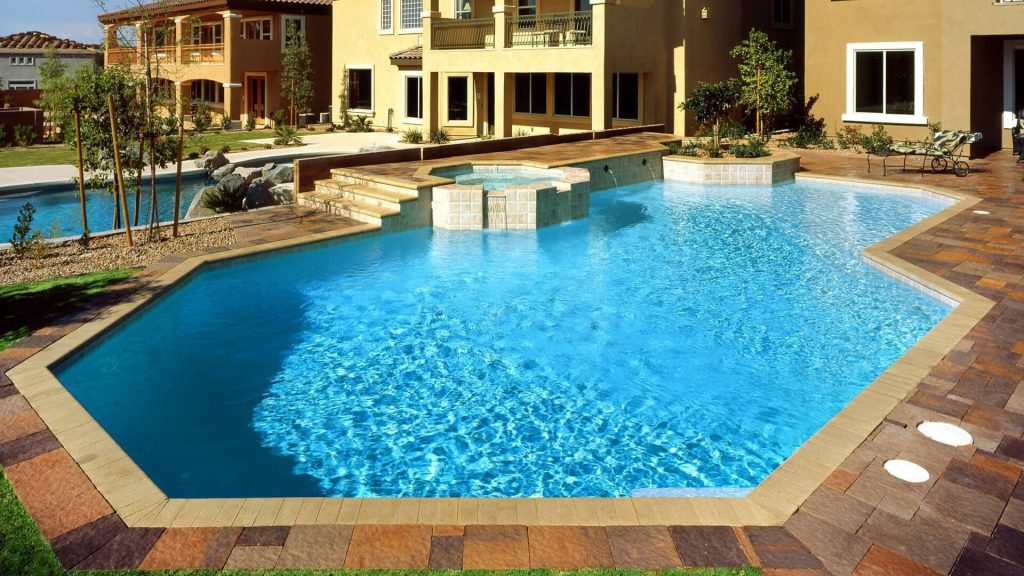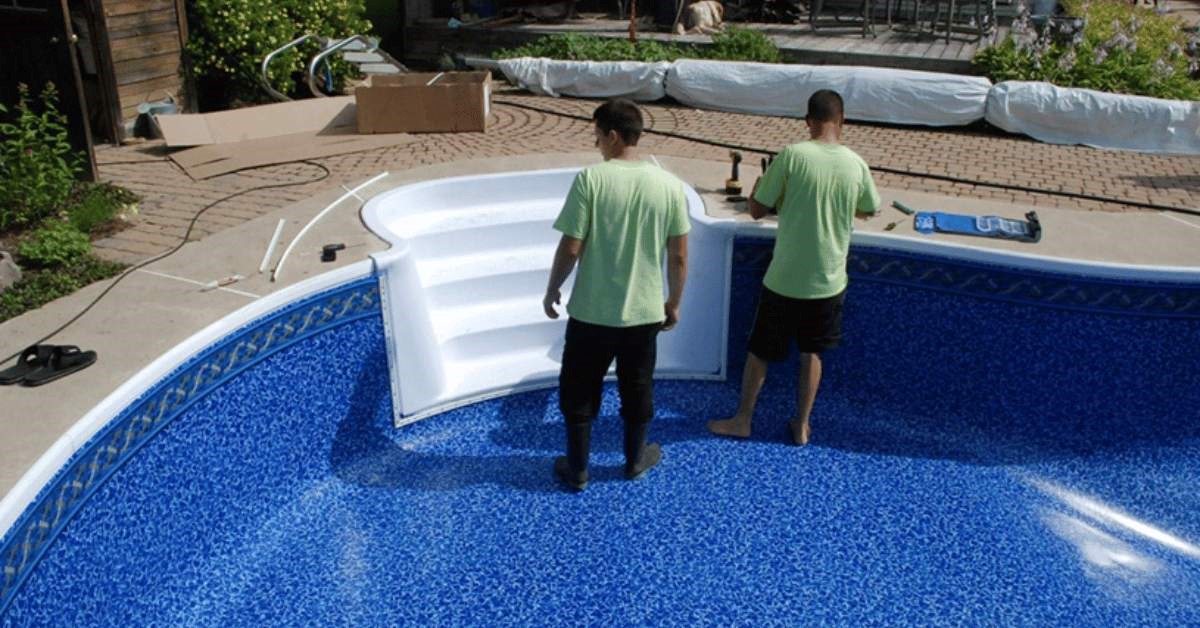Pool resurfacing in Braintree, MA, is essential for maintaining your pool’s longevity and aesthetic appeal. Due to the seasonal fluctuations in Braintree, MA, pools are exposed to a variety of conditions that can cause wear and damage over time. Whether it’s chemical imbalances, harsh weather, or natural wear and tear, maintaining your pool’s surface is crucial to preserving its function and beauty.
An Overview of Pool Resurfacing in Braintree MA
Pool resurfacing, which involves applying a new layer of material to the inside surface of the pool, is a crucial component of pool upkeep.
Many factors get worse over time; some of them are listed here.
- Chemical problems
- Frequent damage
- Atmospheric conditions
Understanding when and why to resurface your pool will help ensure it remains a beautiful, safe retreat for many years.
Signs You Need Pool Resurfacing in Braintree MA
Recognizing the early signs that your pool needs resurfacing can save you from more costly repairs later. Here are some common indicators:
-
Cracks and Chips: If the pool’s surface has visible cracks or chipped areas, it’s time to resurface in Braintree MA.
-
Discoloration and Stains: Persistent stains that do not respond to regular cleaning may indicate surface damage.
-
Water Leakage: Any structural flaws that result in water loss should be addressed with resurfacing.
-
Rough Surface Texture: If the surface feels rough or uneven, resurfacing can restore a smooth, safe finish.
Types of Pool Surfaces for Resurfacing
Different pools require different resurfacing methods. Here are some standard options for pool resurfacing in Braintree MA:
-
Concrete Pools:
-
Known for their strength and durability, but are prone to cracking over time. Pool resurfacing in Braintree MA often involves applying a new plaster coat to restore smoothness.
-
-
Fiberglass Pools:
-
These pools resist algae but can develop blisters. Resurfacing typically involves a gel coat application.
-
-
Vinyl Lined Pools:
-
Cost-effective but susceptible to tears and fading. Resurfacing usually involves replacing the vinyl liner.
-
Factors Affecting Pool Resurfacing in Braintree MA

Several factors can influence the resurfacing schedule and methods:
-
Pool Age: Older pools are more likely to require resurfacing. In Braintree MA, concrete pools may need resurfacing every 10-15 years.
-
Chemical Imbalance: Maintaining proper chemical levels helps prolong the surface life.
-
Weather Conditions: Harsh winters and hot summers can negatively affect the pool’s surface, making resurfacing more frequent.
Best Time for Pool Resurfacing in Braintree MA
Spring and fall are the best seasons for pool resurfacing in Braintree MA. During these times, temperatures are more moderate, allowing resurfacing materials to cure properly. Planning resurfacing during the off-season also ensures that your pool is ready for use during the summer months.
The Pool Resurfacing Process in Braintree MA
A professional approach to pool resurfacing in Braintree MA follows these steps:
-
Assessment: A thorough inspection to identify damage.
-
Drainage: Removing all water from the pool.
-
Surface Preparation: Cleaning, sanding, and repairing any damage.
-
Application: Applying the resurfacing material, whether plaster, fiberglass, or vinyl.
-
Curing: Allowing the surface to set and dry properly before refilling the pool.
Costs Involved in Pool Resurfacing in Braintree MA
The cost of pool resurfacing in Braintree MA can vary significantly based on:
-
Pool Size: Larger pools naturally cost more.
-
Surface Material: Higher-quality finishes like pebble or quartz cost more than bare plaster.
-
Repairs: Fixing structural issues adds to the overall cost.
Investing in quality resurfacing materials ensures durability and long-lasting performance.
Benefits of Pool Resurfacing in Braintree MA
Resurfacing your pool brings numerous advantages:
-
Enhanced Aesthetics: Fresh surfaces make the pool look new and appealing.
-
Increased Safety: Smooth finishes reduce the risk of cuts and abrasions.
-
Extended Pool Life: Regular resurfacing prevents long-term damage, saving money in the long run.
-
Improved Property Value: Well-maintained pools add value to your home.
Maintenance Tips Post-Resurfacing
To keep your newly resurfaced pool in top shape, follow these tips:
-
Regular Cleaning: Brush and vacuum the pool weekly.
-
Chemical Balance: Test water regularly to maintain optimal pH and chlorine levels.
-
Seasonal Maintenance: Prepare your pool for winter and summer to protect the surface.
Choosing a Contractor for Pool Resurfacing in Braintree MA
Hiring a professional ensures quality results. Look for contractors who:
-
Have experience with various pool types.
-
Offer warranties on their work.
-
Use high-quality materials suited for Braintree MA’s climate.
Final Thought
Pool resurfacing in Braintree MA is an investment in your pool’s safety, longevity, and aesthetic appeal. Whether you have a concrete, fiberglass, or vinyl pool, resurfacing ensures that your pool remains an inviting and safe space for years. By working with a reputable contractor and choosing quality materials, you can enjoy a beautiful, durable pool that withstands the test of time.
If you’re looking for professional pool resurfacing in Braintree MA, hire experts who understand the local climate and provide lasting solutions. With the right approach, your pool will look great and serve as a safe and enjoyable retreat for your family and friends.
Related Links
- Essential DIY Guide to Perfect Gunite Pool Tile Repair & Replacement
- Pool Tile Replacement in Sutton, MA
- Pool Tile Replacement in Nashua NH
- Pool Tile Replacement in Plymouth MA
- Pool Tile Replacement in Manchester, NH
FAQ’s
In Braintree, Massachusetts, why is pool resurfacing important?
Seasonal fluctuations in Braintree can damage pools. Resurfacing increases longevity, preserves structural integrity, and enhances beauty.
How can I determine if I need to resurface my pool?
Check the area for abrasion, water loss, rough textures, chipping, and cracks. These indicators point to the necessity of resurfacing.
What kinds of pool surfaces are suitable for resurfacing?
Pools with fiberglass, concrete, or vinyl linings can all be resurfaced, but different techniques are required.
How often should my pool be resurfaced?
Resurfacing is necessary for concrete pools every ten to fifteen years; depending on upkeep, fiberglass and vinyl-lined pools require it less frequently.
What factors influence the cost of pool resurfacing?
Costs depend on pool size, material choice, and necessary repairs. Advanced-quality materials and expensive repairs increase costs but offer better continuity.




 Find Me Here
Find Me Here

